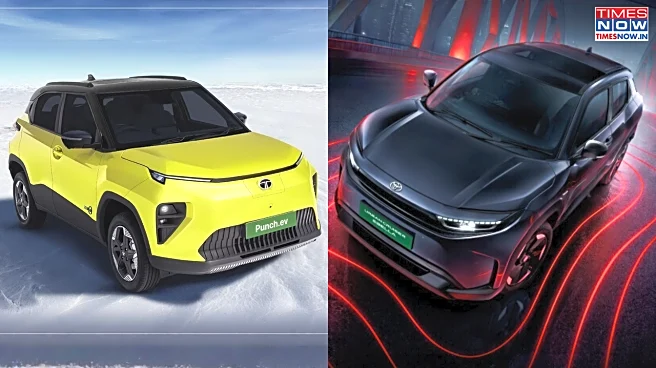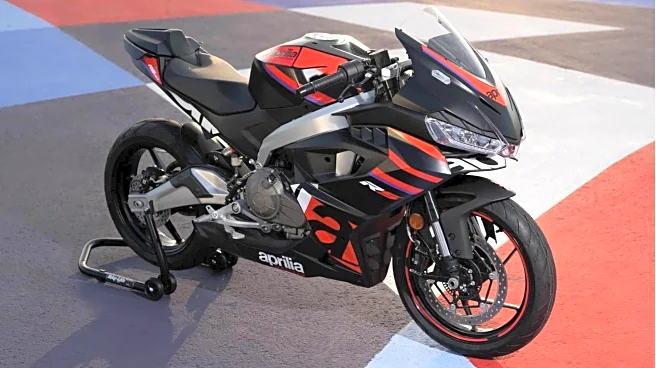What is the story about?
Tesla introduced cheaper standard versions of its Model 3 sedan and Model Y SUV on October 7. The Model 3 starts at $36,990. The Model Y starts at $39,990. These prices are 13% lower than the premium long-range Model 3 and 11% lower than the premium long-range Model Y. Production of the new models began in June.
Tesla's update comes at a time when it is grappling with a sales slump from an ageing lineup and competition from Volkswagen and BYD. Sales slowed in China and Europe. Musk's far-right endorsements and rhetoric sparked consumer backlash and boycotts.
According to media reports, company executives delayed full output until after the US ended $7,500 federal EV tax credits in September. Tesla calls the vehicles its cash engine to support a pivot to autonomy and robotics.
Elon Musk, CEO of Tesla, has prioritised self-driving technology and humanoid robots over a $25,000 model. The company cancelled plans for that cheaper EV last year. Musk promised a vehicle below $30,000, including tax credits. Reports also say that Tesla plans a stripped-down Model 3.
Affordable cars will help Tesla reach 20 million annual deliveries in the next decade. This goal is part of Musk's proposed $1 trillion pay package. Tesla released a new Full Self-Driving (Supervised) driver assistance system on the same day.
The new Model Y has rear-wheel drive. It offers 321 miles of range on a full charge. This is less than the 357 miles in the long-range rear-wheel-drive version. The model lacks a panoramic glass roof, leather seats, light bars, and a second-row touchscreen. It has a fabric interior instead of microsuede and fewer audio speakers. The price is $5,000 below the prior entry-level Model Y.
The new Model 3 also has rear-wheel drive. It matches the Model Y's 321-mile range. It cuts ambient lighting and other features. Tesla faces competition in the $40,000 range. Key comparisons to rivals include:
Volkswagen ID.4 (2025, Pro): Starts at $45,095; 291-mile range; charges 10-80% in 28-30 minutes; accelerates 0-60 mph in 4.9 seconds with dual-motor all-wheel drive; offers lane change assist, parking assist, and memory parking.
Kia EV4 (Expected): Starts at $35,000; up to 391-mile range (WLTP); charges 10-80% in around 30 minutes; accelerates 0-60 mph in 7.4-7.7 seconds; includes detect assist and advanced features in higher trims.
Hyundai Ioniq 5: Starts at $42,600; 318-mile range; charges 10-80% in 20 minutes; accelerates 0-60 mph in around 7.4 seconds; provides collision avoidance lane follow assist and level 2 assist for higher trims.
Chevrolet Equinox EV: Starts at $33,600; around 319-mile range on front-wheel drive; charges 10-80% in 10-45 minutes depending on charger type; accelerates 0-60 mph in around 7.4 seconds with single-motor front-wheel drive; includes safety assist with lane alert and collision alert.
The new models charge faster than some rivals. The Model Y adds up to 160 miles in 15 minutes. The Model 3 adds up to 170 miles in 15 minutes. The Volkswagen ID.4 takes 28 to 30 minutes for 10-80%. The Kia EV4 takes around 30 minutes. The Hyundai Ioniq 5 takes 20 minutes. The Chevrolet Equinox EV takes 10 to 45 minutes, depending on the charger.
Tesla's acceleration beats most competitors. The Model 3 reaches 0-60 mph in 5.8 seconds. The Model Y does it in 6.8 seconds. The Volkswagen ID.4 takes 4.9 seconds with all-wheel drive. The Kia EV4 takes 7.4 to 7.7 seconds. The Hyundai Ioniq 5 takes around 7.4 seconds. The Chevrolet Equinox EV takes around 7.4 seconds.
Driver assist features vary, as Tesla includes traffic-aware cruise control and highway driving assist on the Model 3. The Model Y has traffic-aware cruise control. The Volkswagen ID.4 offers lane change assist, parking assist, and memory parking.
The Kia EV4 has detect assist and advanced features in higher trims. The Hyundai Ioniq 5 provides collision avoidance, lane follow assist and level 2 assist for higher trims. The Chevrolet Equinox EV includes safety assist with lane alert and collision alert.
Interestingly, Tesla has not released a new model since Cybertruck shipments started in late 2023. Musk unveiled Cybertruck in 2019. A demo shattered a window. It faced eight US recalls. It did not match Model 3 or Model Y popularity.
Musk has shifted focus to AI. In October 2024, Tesla held the "We, Robot" event. It showed a Cybercab concept without a steering wheel or pedals. Musk said it would cost $30,000. However, it is still not in production. Musk promised robotaxis via software updates for a decade.
Musk promised a next-generation Roadster in 2017. It has not entered production. In 2021, he said it would fly. Last year, he said SpaceX helped redesign it.
(With input from agencies)
Tesla's update comes at a time when it is grappling with a sales slump from an ageing lineup and competition from Volkswagen and BYD. Sales slowed in China and Europe. Musk's far-right endorsements and rhetoric sparked consumer backlash and boycotts.
According to media reports, company executives delayed full output until after the US ended $7,500 federal EV tax credits in September. Tesla calls the vehicles its cash engine to support a pivot to autonomy and robotics.
Elon Musk, CEO of Tesla, has prioritised self-driving technology and humanoid robots over a $25,000 model. The company cancelled plans for that cheaper EV last year. Musk promised a vehicle below $30,000, including tax credits. Reports also say that Tesla plans a stripped-down Model 3.
Affordable cars will help Tesla reach 20 million annual deliveries in the next decade. This goal is part of Musk's proposed $1 trillion pay package. Tesla released a new Full Self-Driving (Supervised) driver assistance system on the same day.
The new Model Y has rear-wheel drive. It offers 321 miles of range on a full charge. This is less than the 357 miles in the long-range rear-wheel-drive version. The model lacks a panoramic glass roof, leather seats, light bars, and a second-row touchscreen. It has a fabric interior instead of microsuede and fewer audio speakers. The price is $5,000 below the prior entry-level Model Y.
The new Model 3 also has rear-wheel drive. It matches the Model Y's 321-mile range. It cuts ambient lighting and other features. Tesla faces competition in the $40,000 range. Key comparisons to rivals include:
Volkswagen ID.4 (2025, Pro): Starts at $45,095; 291-mile range; charges 10-80% in 28-30 minutes; accelerates 0-60 mph in 4.9 seconds with dual-motor all-wheel drive; offers lane change assist, parking assist, and memory parking.
Kia EV4 (Expected): Starts at $35,000; up to 391-mile range (WLTP); charges 10-80% in around 30 minutes; accelerates 0-60 mph in 7.4-7.7 seconds; includes detect assist and advanced features in higher trims.
Hyundai Ioniq 5: Starts at $42,600; 318-mile range; charges 10-80% in 20 minutes; accelerates 0-60 mph in around 7.4 seconds; provides collision avoidance lane follow assist and level 2 assist for higher trims.
Chevrolet Equinox EV: Starts at $33,600; around 319-mile range on front-wheel drive; charges 10-80% in 10-45 minutes depending on charger type; accelerates 0-60 mph in around 7.4 seconds with single-motor front-wheel drive; includes safety assist with lane alert and collision alert.
The new models charge faster than some rivals. The Model Y adds up to 160 miles in 15 minutes. The Model 3 adds up to 170 miles in 15 minutes. The Volkswagen ID.4 takes 28 to 30 minutes for 10-80%. The Kia EV4 takes around 30 minutes. The Hyundai Ioniq 5 takes 20 minutes. The Chevrolet Equinox EV takes 10 to 45 minutes, depending on the charger.
Tesla's acceleration beats most competitors. The Model 3 reaches 0-60 mph in 5.8 seconds. The Model Y does it in 6.8 seconds. The Volkswagen ID.4 takes 4.9 seconds with all-wheel drive. The Kia EV4 takes 7.4 to 7.7 seconds. The Hyundai Ioniq 5 takes around 7.4 seconds. The Chevrolet Equinox EV takes around 7.4 seconds.
Driver assist features vary, as Tesla includes traffic-aware cruise control and highway driving assist on the Model 3. The Model Y has traffic-aware cruise control. The Volkswagen ID.4 offers lane change assist, parking assist, and memory parking.
The Kia EV4 has detect assist and advanced features in higher trims. The Hyundai Ioniq 5 provides collision avoidance, lane follow assist and level 2 assist for higher trims. The Chevrolet Equinox EV includes safety assist with lane alert and collision alert.
Interestingly, Tesla has not released a new model since Cybertruck shipments started in late 2023. Musk unveiled Cybertruck in 2019. A demo shattered a window. It faced eight US recalls. It did not match Model 3 or Model Y popularity.
Musk has shifted focus to AI. In October 2024, Tesla held the "We, Robot" event. It showed a Cybercab concept without a steering wheel or pedals. Musk said it would cost $30,000. However, it is still not in production. Musk promised robotaxis via software updates for a decade.
Musk promised a next-generation Roadster in 2017. It has not entered production. In 2021, he said it would fly. Last year, he said SpaceX helped redesign it.
(With input from agencies)
/images/ppid_59c68470-image-175990753396948592.webp)



/images/ppid_a911dc6a-image-177071187085537069.webp)
/images/ppid_a911dc6a-image-177071311265874579.webp)

/images/ppid_a911dc6a-image-177071314953421767.webp)
/images/ppid_a911dc6a-image-177071307920887358.webp)
/images/ppid_a911dc6a-image-177071303076331213.webp)






/images/ppid_59c68470-image-177071258499638831.webp)